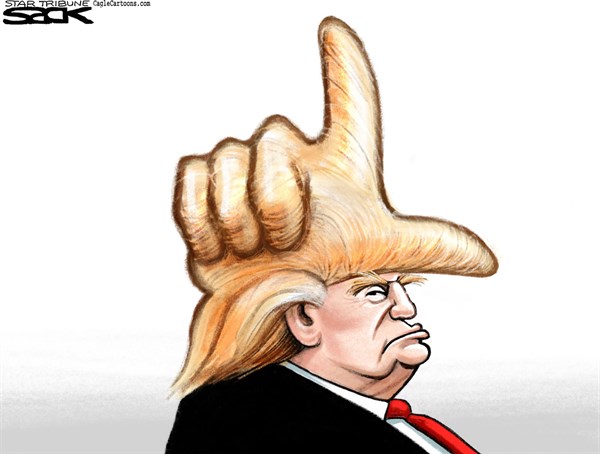
Episodic evidence suggests the possibility of a Donald Trump implosion during the March primaries. In the latest ABC/Washington Post poll, he wins 34 percent of the national vote — 4 points below his Real Clear Politics average of the last five polls — while Ted Cruz runs second, with 25 percent (6 points above his average), Marco Rubio runs third, at 18 percent, and John Kasich is at 13 percent. Compared with the last ABC poll, on Jan. 24, Trump is down 3 points, Cruz is up 4 and Rubio is up 7.
So what does this mean?
The national data, plus the recent Cruz victories in Kansas and Maine and his close finishes in Kentucky and Louisiana, add to the speculation that the front-runner may be dropping.
But is that trend across the board or just due to the circumstances of the recent races?
While Trump is showing signs of wear, the March 5 primaries also showed that Rubio voters (aka former supporters of Jeb Bush and Chris Christie) are switching to Cruz, winning him a close second-place finish. There is a lot of realignment going on. But whether this is a downward spiral for Trump or just a unique circumstance of this moment in the race is still not clear.
The irony of the March 15 winner-take-all primaries in Ohio and Florida is that if Trump wins, he loses: if he knocks Rubio, a Florida senator, and/or Kasich, Ohio's governor, out of the race by winning their home states, he sets up a two-way race against Cruz that he may not be able to win.
While Trump in this scenario will have amassed a big lead in delegates through his winner-take-all sweeps in Florida and Ohio, Cruz will likely still have pulled out a lot of delegates — and perhaps pluralities — in the other March 15 states (North Carolina, Missouri and Illinois), holding down the Trump lead.
Regardless, most polls show that Cruz beats Trump one-on-one in a landslide, so Rubio's or Kasich's defeat likely opens the path to an ultimate victory for the Texas senator. The most recent ABC/Washington Post poll has Cruz beating Trump 54 percent to 41 percent.
If Rubio or Kasich — or both — pull out wins in their home states, it could presage a four-way race with Trump so weakened that he just falls back among the other candidates and surrenders his front-runner status. A race may then emerge among a beleaguered and fading Trump, a surging Cruz, Rubio on his second comeback and a newly viable Kasich (who may be aided by a strong Michigan showing).
A brokered convention? Not very likely.
The fault line that runs through the primaries pitting the establishment against the insurgents still remains. With Trump and Cruz on one side of the fault line, they are locked in a zero-sum game where any votes Trump loses go to Cruz particularly as issues like amnesty kick in. There are more than enough votes on that side of the divide to nominate Cruz should Trump continue to fall.
But, on the other side of the fault line — Rubio v. Kasich — it is not a zero sum game. Rubio voters are mainly motivated by fear of Trump. That's why so many of them, who were once for Bush, Christie or Carly Fiorina, switched to Rubio in the first place. As Cruz emerges as the main alternative to Trump, we know from the March 5 primaries that Rubio's voters tend to defect and vote for the Texan to stop Trump.
But, if Trump wins Florida and Ohio (winner-take-all states) and also wins the other big March 8 and 15 states — Michigan, Missouri, Illinois and North Carolina — he may have amassed enough delegates to win despite Cruz victories in the subsequent two-way contests. That might be the Donald's only path to victory.
(Note: This column was written before March 8 primary results became available.)
Comment by clicking here.
Dick Morris, who served as adviser to former Sen. Trent Lott (R-Miss.) and former President Clinton, is the author of 16 books, including his latest, Screwed and Here Come the Black Helicopters.



 Contact The Editor
Contact The Editor
 Articles By This Author
Articles By This Author